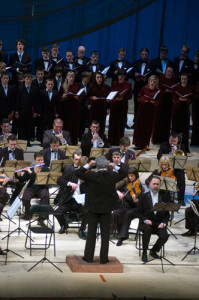Everything was beautiful. The performance was exhilarating. At the final chord, the conductor motioned for everyone to end what was to be a resounding and reverberating conclusion to the “Hallelujah Chorus” from Handel’s Messiah, but wait—something was wrong. Everyone ended expertly except for the deep, low-pitched fundamental note on the organ. It kept sounding even though the performer stopped playing.
Have you ever been in a situation where everything was perfect and suddenly something happened—there was a shocking turn of events that felt like it changed everything?
The conductor gave the organist a look of panic and motioned again for the note to cut-off. The note kept going. He turned to face the organist now, motioning for the sound to end, ignoring all of the other performers who had already finished their performance. What now? Finally he motioned and yelled at the same time—turn it off…turn it off!
The organist turned off the power to the instrument and the sound gradually died away; the note sagged lower and lower in pitch and ended weakly as the air in the pipe lost its momentum.
 The power of the conductor’s motions couldn’t match the technical apparatus of the organ. When a key is depressed, the key action admits wind into a pipe. Since the spring on the depressed key had broken, it couldn’t pop back up after the player let go. The wind kept air blowing through the pipe for that note.
The power of the conductor’s motions couldn’t match the technical apparatus of the organ. When a key is depressed, the key action admits wind into a pipe. Since the spring on the depressed key had broken, it couldn’t pop back up after the player let go. The wind kept air blowing through the pipe for that note.
The audience was exhilarated by the performance and understood there was a problem with the instrument. It had little impact on the power of the performance as a whole. In fact, it seemed to deepen the joy of the performance. When the sound finally died away in a halfhearted, meager surrender, there was at first a moment of silence as the conductor and organist stood facing the audience, terribly distressed by their dilemma. Suddenly, there was thunderous applause, a standing ovation, and several curtain calls as appreciation for the uplifting and beautiful performance burst forth.
When things are perfect, that’s when you need to worry most.
~ Drew Barrymore
Artists become aware, day after day, they must face the lack of perfection in a very public way. Awareness is the first step in acknowledging any life challenge. Think about how you might be responding to a particular event, circumstance, or person. What are your initial feelings? Why are you feeling this way? What is the bigger picture?
 Handel, who wrote the “Hallelujah Chorus,” created an expression that is rich with imaginative energy. It is astonishingly expressive. He created numerous versions, fitting it to the time, place, and performers available. One is not more perfect than the rest. It is the spiritual and psychological components—the simplicity of the architecture—that is genius.
Handel, who wrote the “Hallelujah Chorus,” created an expression that is rich with imaginative energy. It is astonishingly expressive. He created numerous versions, fitting it to the time, place, and performers available. One is not more perfect than the rest. It is the spiritual and psychological components—the simplicity of the architecture—that is genius.
As the applause grew, the embarrassed conductor and organist, along with the entire ensemble of musicians, finally realized that the beauty came from the entire experience. The performers and more than 1500 people in the audience had together, as a community, experienced something transformative.
Remember that when the organ note fails at the end, everything that happened along the way is not lost completely. The beauty is sometimes in the imperfections.
When we can no longer change a situation,
we are challenged to change ourselves.
~Viktor Frankl
Enjoy these “Hallelujah Chorus” experiences:
Pure Power of Handel’s “Hallelujah Chorus”-NPR
~ Pat
Sign-up for the Arts Awareness eNewsletter and receive a free gift “Three Lessons to Begin to Make Artistic Principles Work for You in Fascinating Ways.” Like Arts Awareness on facebook.
